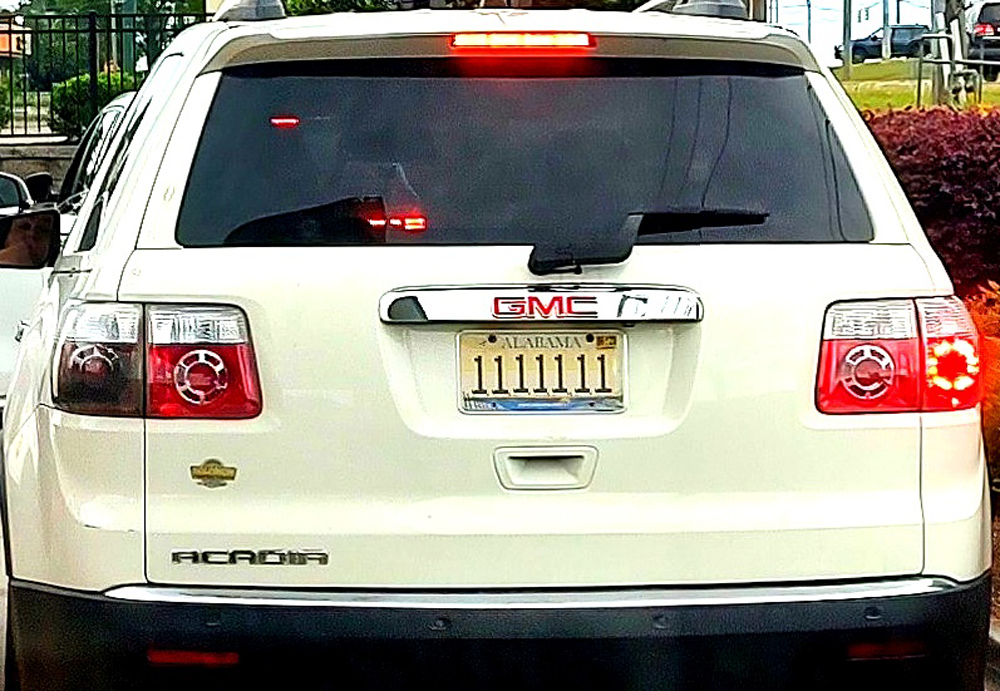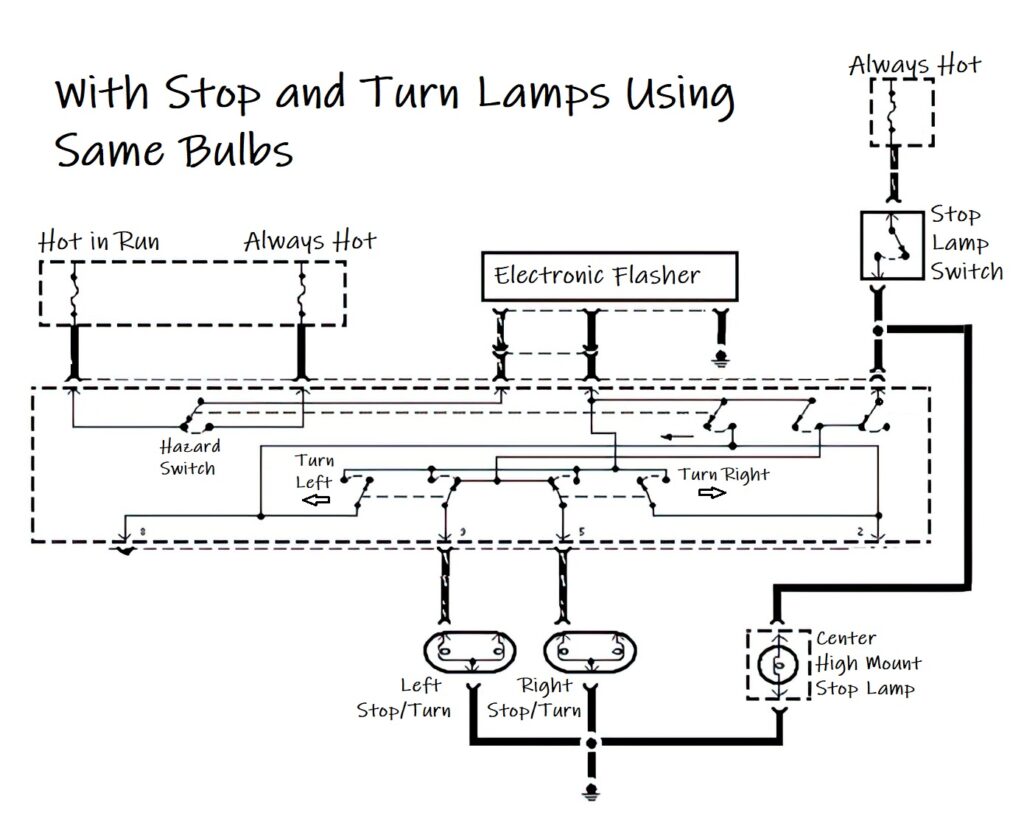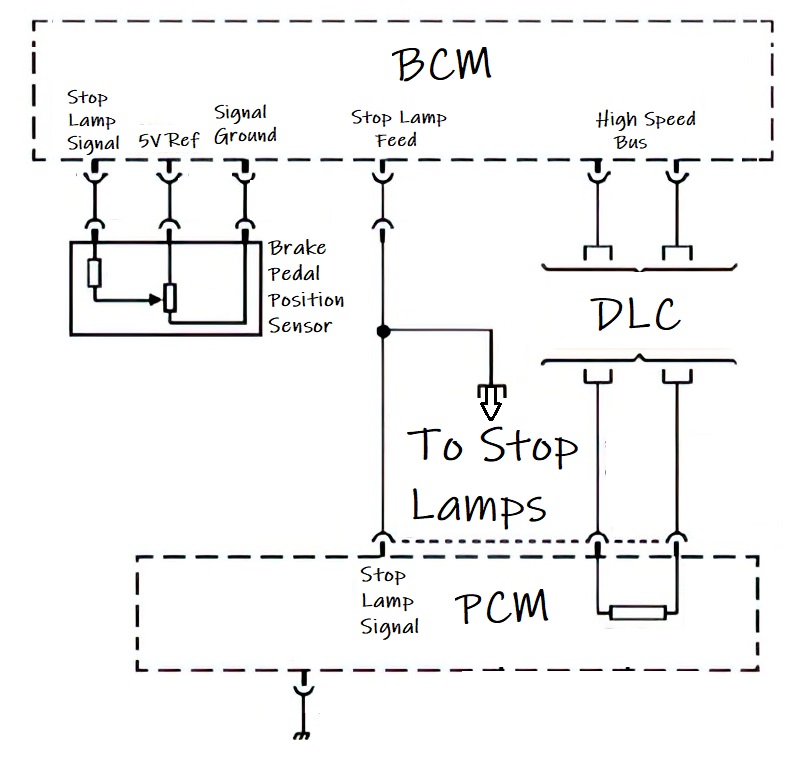Brake lights warn the driver behind you when you press the brake pedal, giving them time to brake to avoid hitting your vehicle. So you’re more likely to get into an accident if they’re not working. Also, note that center high mount stop lamps (CHMSL) are required by law and if yours doesn’t work, you’re 40% more likely to be rear-ended by another vehicle.
Why Do Brake Lights Fail?
Brake lights can fail due to the following issues:
Blown Bulb
Brake lights can fail when their bulbs burn out. They usually have halogen or LED bulbs.
Most modern vehicles have LED bulbs, which last more than five years, while older models use halogen bulbs, which last up to 2 years on average.

Malfunctioning Brake Light Switch or Circuit
Any fault in the brake light switch can cause problems for brake lights.
For example, corrosion at the switch terminals or contacts can disrupt the light’s circuitry. The analog switch also wears out as it ages, which could lead to brake light issues.
Blown Fuse
Although it’s normal for an old fuse to blow, a short circuit in the wirings or connectors could affect the brake light. The electric surge can damage the brake light’s fuse.



Wiring Issues
Frayed or corroded wires can cause your brake lights to malfunction. Sometimes the movement of the brake pedal will bend the switch wires until one or both of them break at the switch, and in that case, the transmission will not come out of park.
Also, loose connections and damaged wire ends can cause bad electrical ground.
Sometimes the movement of the brake pedal will bend the switch wires until one or both of them break at the switch, and in that case, the transmission will not come out of park.
– Richard McCuistian, ASE Certified Master Automobile Technician
Bad Socket
If only one of your brake lights is faulty, its socket or connectors might be dirty or corroded. Check for signs of wear, dirt, and corrosion to confirm.
Why Should You Avoid Driving With Bad Brake Lights?
You can continue driving because your vehicle would still work, but that doesn’t mean that you should. Here’s why.
Increased Risk of Accidents
Without brake lights, drivers behind you can’t tell when you’re slowing or stopping. So if you brake abruptly, they might hit your vehicle. According to a study, rear-end collisions account for 29% of road accidents that led to serious injuries.
More Liability
The vehicle that’s at fault is liable in case of an accident. So if you crashed into a car because its brake lights aren’t working, then you might be able to file a compensation claim. Likewise, if you get rear-ended while driving with faulty brake lights, you could get in trouble with the law.
Legal Concerns
It’s illegal to drive with bad brake lights in some states. You can get pulled over by the authorities if yours isn’t working. You could get a ticket if more than one of your brake lights is faulty. Fines can vary depending on the state where you’re in.
Shift Lock Override
If your ride has a shift lock override, it would activate when it detects that one of your brake lights is out. It prevents the car from shifting once there’s a mechanic error detected. So you’ll risk damaging your transmission system if you continue to drive with bad brake lights.

How Much Does It Cost to Fix a Brake Light?
It depends on what’s causing the issue. For example, if you’re dealing with a bad brake light bulb, expect to shell out around $5 to $10 for a replacement. Mechanics might charge $10 to $20 for labor, depending on your vehicle’s make and model.
What to Consider When Shopping for Brake Lights
There’s no shortage of brake lights on the market. To help you narrow down your options, here are some factors to consider when shopping for brake light replacements:
Compatibility
If your new brake lights are incompatible with your vehicle, they might not fit or work as they should. So consider only replacements that are designed for your year, make, and model.
Bulb Type
You can get the same type as your stock part or get a different one. Make sure you know the pros and cons of LED and halogen light bulbs before you decide. For example, LED bulbs have a longer lifespan, but they generally cost more than other bulbs.
Brand
Aftermarket brake lights perform just like their OE counterparts. They’re more affordable because third-party manufacturers produce them, so they’re a great choice if you’re shopping on a budget. If you don’t have a go-to brand for replacement parts, check out brand and product reviews for more information.
Where to Get New Brake Lights for Your Vehicle
As mentioned, one of the things you should consider when looking for new brake lights is compatibility. It’s also arguably the most crucial part because you’ll be wasting both time and money if you order incorrect lights. Lucky for you, CarParts.com makes it easier to find ones that fit.
To check out the brake lights that are compatible with your ride, fill out our vehicle selector. Then, you can further refine the results to show the brake lights that match your preferred brand, price, and features using the search filters. Our catalog includes accurate and detailed fitment information, but if you have questions, don’t hesitate to reach out to our round-the-clock customer service team via our toll-free hotlines.
We guarantee our brake lights are built to last because we sourced them from the best aftermarket brands in the industry. They’re also on hand, ready to ship, and available at competitive prices.
Check out our selection today and shop now!
Any information provided on this Website is for informational purposes only and is not intended to replace consultation with a professional mechanic. The accuracy and timeliness of the information may change from the time of publication.






























